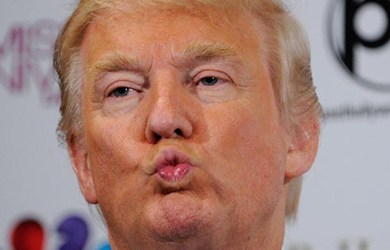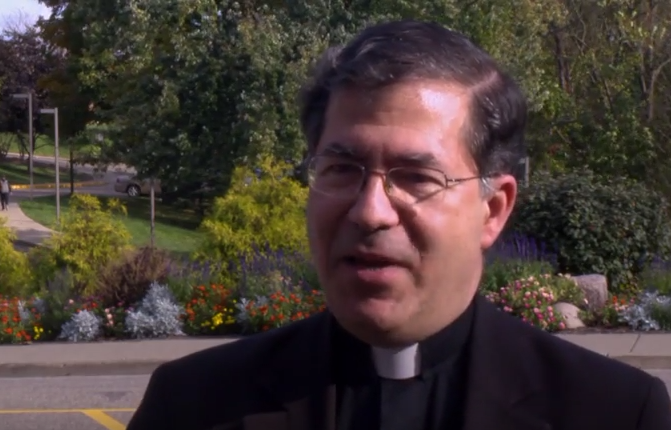Andrew Puzder, President-elect Donald Trump’s pick to lead the Department of Labor, has been coming under fire for his opposition to workers’ rights policies like raising the minimum wage. But Puzder, who is now the CEO of the fast food company that runs Hardee’s and Carl’s Jr., also has a history in the fringes of abortion politics.
Working as an attorney in St. Louis, Puzder drafted the bill that led to the 1989 case Webster v. Reproductive Health Services, one of the strongest challenges to Roe v. Wade to reach the Supreme Court. But before that, he attempted to stop legal abortion another way—by representing the anti-choice protesters who were pioneering a strategy of blocking access to abortion by literally blockading the entrances to clinics.
The Associated Press reported in 1989 that Puzder had “represented about 200 anti-abortion protesters” and won “11 of 12 cases” using the “necessity defense,” the argument that protesters blocking access to abortion clinics were doing so out of a sincere belief that their actions were saving lives.
Puzder worked often with Sam Lee, a pioneer in the abortion clinic protest movement who helped make St. Louis the epicenter of abortion protests in the late 1970s and early 1980s. Joseph Scheidler, a Chicago activist who became a major figure in the anti-abortion “rescue” movement, recalled to journalists James Risen and Judy L. Thomas in an interview published in their 1998 book “Wrath of Angels” how Lee had trained him to stage sit-ins by first scoping out clinics:
Lee “laid out the whole thing,” Scheidler recalls. “You case the clinic, you send somebody in as a patient to find out the layout as best they can and make a sketch. We had a great big storage room upstairs, and so we chalked off the layout of the whole clinic. The rooms, the chairs, the waiting room. We planned the whole thing; every move.”
Risen and Thomas wrote about how Lee and his allies used this technique to prepare for their sieges of Reproductive Health Services, an abortion provider in St. Louis that later became a party in the Supreme Court case spurred by Puzder’s law:
Before staging sit-ins there, Sam Lee and Jean Klocker, another student activist, went to [Reproductive Health Services] pretending to be a couple interested in abortion. Clinic personnel quickly determined that Klocker was not pregnant and instead discovered and warned her of an ovarian cyst. The timely diagnosis did not deter the two from coming back to block the doors.
In 1983, Puzder was one of two attorneys representing Lee, Klocker and 11 others in a procedural appeal of a county court’s order that they stop trespassing at the building that housed Reproductive Health Services. The Missouri Court of Appeals’ opinion in that case, Reproductive Health Services v. Lee, lays out the group’s history of blocking access to the clinic:
On July 5, 1979, defendants Klocker, Lee and Peterson gained access to the premises occupied by Reproductive Health Services, and blocked access to the clinic portion of the premises leased by Reproductive Health Services from the waiting room by sitting on the floor. When asked to leave each responded that they would not leave. The police were summoned and the defendants were removed from the premises — “carried out.” Formal trespass charges were filed against each of these defendants.
On September 15, 1979, defendants Klocker, Lee, Peterson and Hatch again entered the premises, went to the same location on the second floor and blocked the premises so that it was impossible for patients to go through the door into the general facility area. When requested to leave, the defendants refused and again the police were summoned, and when they refused the request of the police that they leave, they were forcibly removed from the premises by the police officers.
Similar incidents occurred on December 8, 1979, April 5, 1980, and May 15, 1980. Defendants Bland, Hannegan, Finnegan, Danis, Kidwell, the two Andrews sisters [Joan Andrews and Miriam Andrews], Volk, Hatch, Klocker, Lee, Peterson and Gibson participated in the December 8, 1979 incident. The Andrews sisters, Finnegan, Koterski, and Klocker participated in the April 5, 1980 incident. Bland, the Armstrong sisters, the Andrews sisters, and Lee participated in the May 15, 1980 incident.
The defendants’ conduct disrupted the ordinary surgery scheduled to be performed, caused some patients who witnessed the occurrences to cry, created stress on staff members, and caused some patients to go to another abortion clinic. Some employees of the clinic were unable to enter the clinic premises, and the business could not be conducted in a normal manner. Doors which had not previously been locked now had to be locked and security had to be stepped-up.
These incidents also made other tenants of the building very unhappy.
[Accessed via Lexis]
In another case, St. Louis v. Klocker, Puzder was one of the attorneys representing Klocker and fellow activists in an unsuccessful appeal of their “necessity defense” to the state court of appeals. The opinion in that case describes a 1980 protest in which the activists sat in the doorways to procedure rooms in an attempt to prevent the clinic from operating:
On the morning of April 5, 1980, defendants went to the offices of Reproductive Health Services (RHS), an abortion clinic in the City of St. Louis. Defendants entered the RHS offices just as that facility was opening. Defendants intended to prevent the abortions scheduled to be performed that day. Toward that end, defendants attempted to dissuade abortion patients from having abortions, by advising those patients about the physical and psychological dangers of abortion. When it became apparent to defendants that their efforts at persuasion had failed and that the patients were about to enter the abortion facility, defendants blocked access to the abortion procedure rooms by sitting in the doorway to those rooms. Defendants were then requested by agents of RHS to leave the premises. Defendants refused to do so. Police officers for the City of St. Louis were called to the scene, and the officers placed defendants under arrest. Defendants refused to assist in moving themselves off the premises, and were, therefore, lifted and carried off the premises by police officers.
[Accessed via Lexis]
Sam Lee eventually became an anti-choice lobbyist and worked with Lee to push through the Missouri bill that they hoped would lead to the overturning of Roe.







